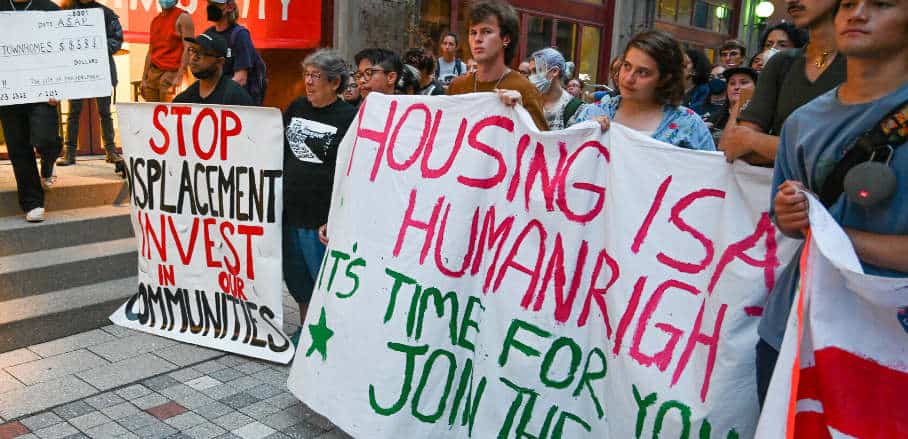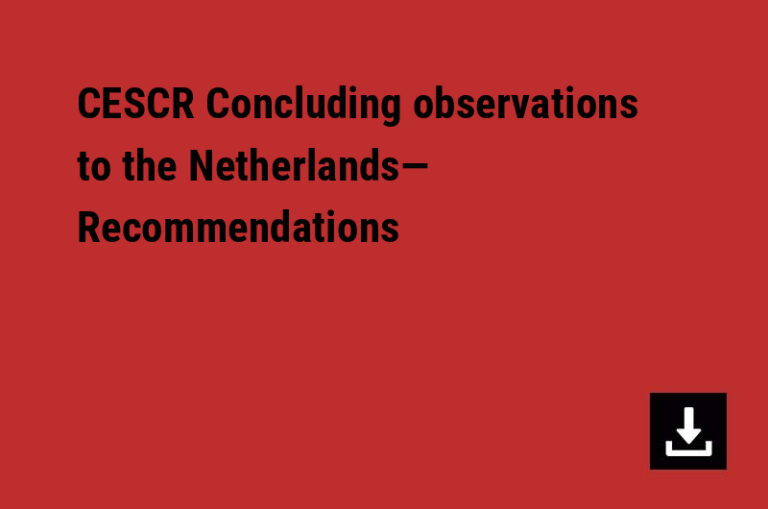Source: Urbanet
By Kirsten McRae
Echoes of the same story can be heard in cities across the globe – homelessness is on the rise and the cost of housing is increasing at an alarming rate while the availability of decent housing dwindles. Kirsten McRae with recent statistics on the global housing crisis and why we should no longer financialise our most basic human good.
Let’s look at the numbers. More than 1.8 billion people around the world do not have adequate housing, an estimated 15 million people are forcibly evicted every year, and 150 million more are living in homelessness. According to Housing and Land Rights Network (HLRN), 24 people were evicted every hour in India between January and March 2022, in the midst of the third wave of the COVID-19 pandemic. Over 1 million people in the country faced evictions from 2017-2022, and over 15 million live under the threat of eviction every day. Of those evicted in 2021, 59 per cent have yet to be resettled or receive compensation.
On the other side of the world, in Los Angeles, homelessness grew by 25 per cent between 2018 and 2020. While this growth slowed due to policy measures taken during the pandemic, homelessness is still on the rise and deaths amongst those living in homelessness went up by 56 per cent from 2020-2021. The chief of homeless services for L.A. County resigned from her position, citing a failure by elected officials to address the root causes of the crisis, such as the lack of affordable housing and wage stagnation. Experts warn that, without swift intervention, existing conditions will lead to mass evictions throughout the city.
At the same time, residential real estate is worth an estimated 260 trillion US Dollars – more than the global GDP a few times over – and is still making a lot of money for investors. Homelessness is on the rise while the value of real estate continues to go up, making it increasingly difficult for those who need housing most to access it.
Housing is Not a Human Right – But it Should Be
This crisis is unlike any that has come before. It is not caused by a decline in resources or an economic downturn but rather by economic expansion coupled with growing inequality, which in many countries is encouraged through legislation and policy. The use of housing as a financial tool, known as financialisation, prioritises dwellings as an asset – rather than as a human right and the foundation for a dignified life. Governments offer low-interest rates, preferential tax treatment, and quantitative easing policies that benefit financial actors while providing little to no protections for tenants.
The justification for this preferential treatment is that these entities are providing necessary housing, and thus governments want to make this easier for them to do. But we must ask ourselves, who are they building for? By and large, the housing currently under construction in populous metro areas is of the luxury variety, designed for those with the money to spare on top-tier amenities – not the affordable housing needed by the growing number of people living in homelessness or on the brink of eviction. We also see these financial actors creeping into housing spaces that have long been deeply affordable and driving up the cost.
Governments have human rights obligations. If governments are essentially outsourcing home provision to private actors, then these private actors must then be held to the same obligations, as they are acting in lieu of the government.
Instead, everything in this financialised world is about the building, the unit, not about the people who require the space as a home. Around the world, millions of homes sit vacant, often times in disrepair, as the value of the homes goes up and people sleep outside.
A System That Benefits Few and Harms Many
While these homes sit empty, many argue that the crisis is being caused by a lack of supply, and the solution is to build ever more housing. Discrepancies over who housing is being built for aside, the drive to build more rather than to repurpose existing structures ignores that we are also experiencing a climate crisis.
In 2020, the built environment accounted for 37 per cent of annual global greenhouse gas emissions. Globally, there are approximately 255 billion square meters of buildings. Approximately 5.5 billion square meters are built every year, which is the equivalent of building a city the size of Paris every week. We are on track to deplete the global carbon budget within 11 years, and construction is a huge part of that. Governments face an inherent tension in their obligations to realise the right to housing by ensuring access to adequate housing for all, while limiting global warming to below 1.5 degrees Celsius. These crises are inextricably linked and, as such, none can be rectified using patchwork policy solutions. Major systemic change that prioritises health, well-being, and climate resilience over profit is needed.
When we define things as a crisis, we imagine a temporary deviation from the norm, but the housing crisis is a symptom of a system that is intended to benefit those in power to the detriment of others. Cities themselves are victims of this system – they are often bound by federal policy that leaves them short-handed and under-budgeted. Disconnects between national and subnational governments prevent funding from reaching the places it is most needed and allow ineffective policies and programmes to consume resources. While federal legislation is desperately needed to curb the impacts of the financialisation of housing, climate change, and growing homelessness, regional governments are better positioned to understand and address housing concerns. Despite this, political decisions around housing are typically made at the federal level, with little input from regional governments.
Housing Must Become a Social Good
The tools to address this misalignment, and the framework needed to effectively address the financialisation of housing have been created, but governments need to put real support into implementing the structural changes needed.
It is time to re-orient housing systems across the world away from financialisation and toward housing as a social good and a fundamental human right. To meet the need for deeply affordable housing while also putting us on track to meet environmental goals. That means prioritising the health and well-being of the most disadvantaged over profit. Recognition of all that we are facing in our efforts to meet these goals creates an opportunity and imperative for states to work together with institutional investors to ensure the housing being developed is in keeping with international human rights law.



